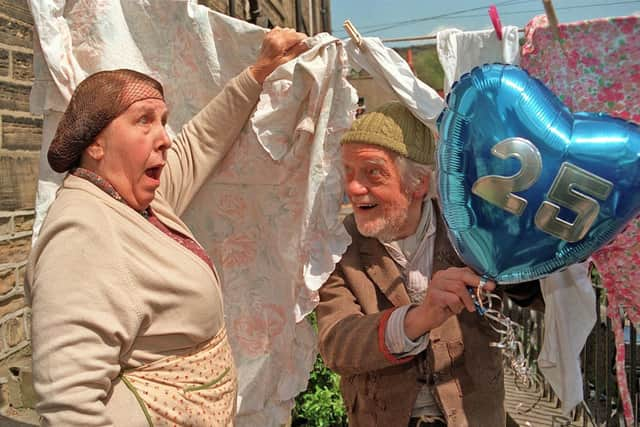How Yorkshire television comedy like Last of the Summer Wine, Rising Damp and Open All Hours kept a nation smiling in the 1970s
When it comes to Yorkshire and television comedy, Holmfirth’s Last of the Summer Wine may always lay claim to being the main example.
That’s with good reason, as it holds the record as the longest-running British TV sitcom of all time.
Advertisement
Hide AdAdvertisement
Hide AdBut the latest book by Leeds-born popular culture writer Robert Sellers explores the genre’s appeal in the 1970s, and discovered that many had links to his home region.


In Raising Laughter: How the Sitcom Kept Britain Smiling in the 70s, Sellers writes about shows such as Queenie’s Castle, Rising Damp and Open All Hours.
Yorkshire Television in Leeds, though, was pivotal.
Sellers said: “Out of all the ITV regions in the 70s, with the possible exception of Thames, Yorkshire Television was responsible for producing the most sitcoms, something like 20 altogether. All of them were shot in front of a live audience at the Leeds Studios, Yorkshire Television’s own production complex on Kirkstall Road.
“The studios had only recently been built, in 1968, on slum clearance land, and was the first purpose-built colour television production centre in Europe.
Advertisement
Hide AdAdvertisement
Hide Ad“This is perhaps why so many ITV shows were produced by Yorkshire since outside of the BBC, they had the best facilities.
“Then, of course, there is the famous Yorkshire no-nonsense sense of humour.”
There are a select number of “best or most interesting” sitcoms either set in Yorkshire or made at Yorkshire Television during the 1970s, he says.
Queenie’s Castle was devised and written by Keith Waterhouse and Willis Hall, the men behind Billy Liar, and cast Diana Dors as the indomitable Queenie Shepherd. Parts were filmed at Leeds’s Quarry Hill, which when built in the late 1930s was the largest social housing complex in the country.
Advertisement
Hide AdAdvertisement
Hide AdSir Yellow was a short-lived sitcom made by Yorkshire Television in 1973 hoped to emulate the success of period romps such Up Pompeii. But Sellers writes: “Everyone working on the show knew it was rotten.”
Rising Damp started as a play until it was spotted by John Duncan, former Head of Light Entertainment at Yorkshire Television, after which it became, in Sellers’ view, “one of the best sitcoms ITV ever produced”. The exact setting is not explicitly stated, although it contained references to Leeds United, the Yorkshire Rider bus company, the M62 and the Corn Exchange.
Subsequently, hospital-based sitcom Only When I Laugh was written by Eric Chappell, fresh from his success with Rising Damp, and became another hit for Yorkshire Television between 1979 and 1982.
Rosie was a gentle BBC comedy from the pen of Roy Clarke, and based on his experiences in the police, which was about a young, idealistic constable whose beat was the fictitious Yorkshire town of Slagcaster, and was filmed in the writer’s native South Yorkshire.
Advertisement
Hide AdAdvertisement
Hide AdOh No – It’s Selwyn Froggitt was Yorkshire Television’s answer to the BBC’s Frank Spencer character. Played by Bill Maynard, Selwyn Froggitt is “a one-man disaster area”, a council labourer and secretary of the local working men’s club in the fictional Yorkshire town of Scarsdale.
The BBC’s I Didn’t Know You Cared was set in South Yorkshire and was a hit between 1975 and 1979.
And perennial favourite Open All Hours, featuring Ronnie Barker’s Arkwright alongside David Jason’s Granville, was connected to Yorkshire.
Sellers writes: “For exterior shooting, a cornershop was located in a suburb of Doncaster. Although it was a hairdressing salon, a quick makeover by the BBC design team rendered it perfect for the job. Inevitably it became a local tourist attraction.”
Raising Laughter: How the Sitcom Kept Britain Smiling in the 70s is published by The History Press and is available now.